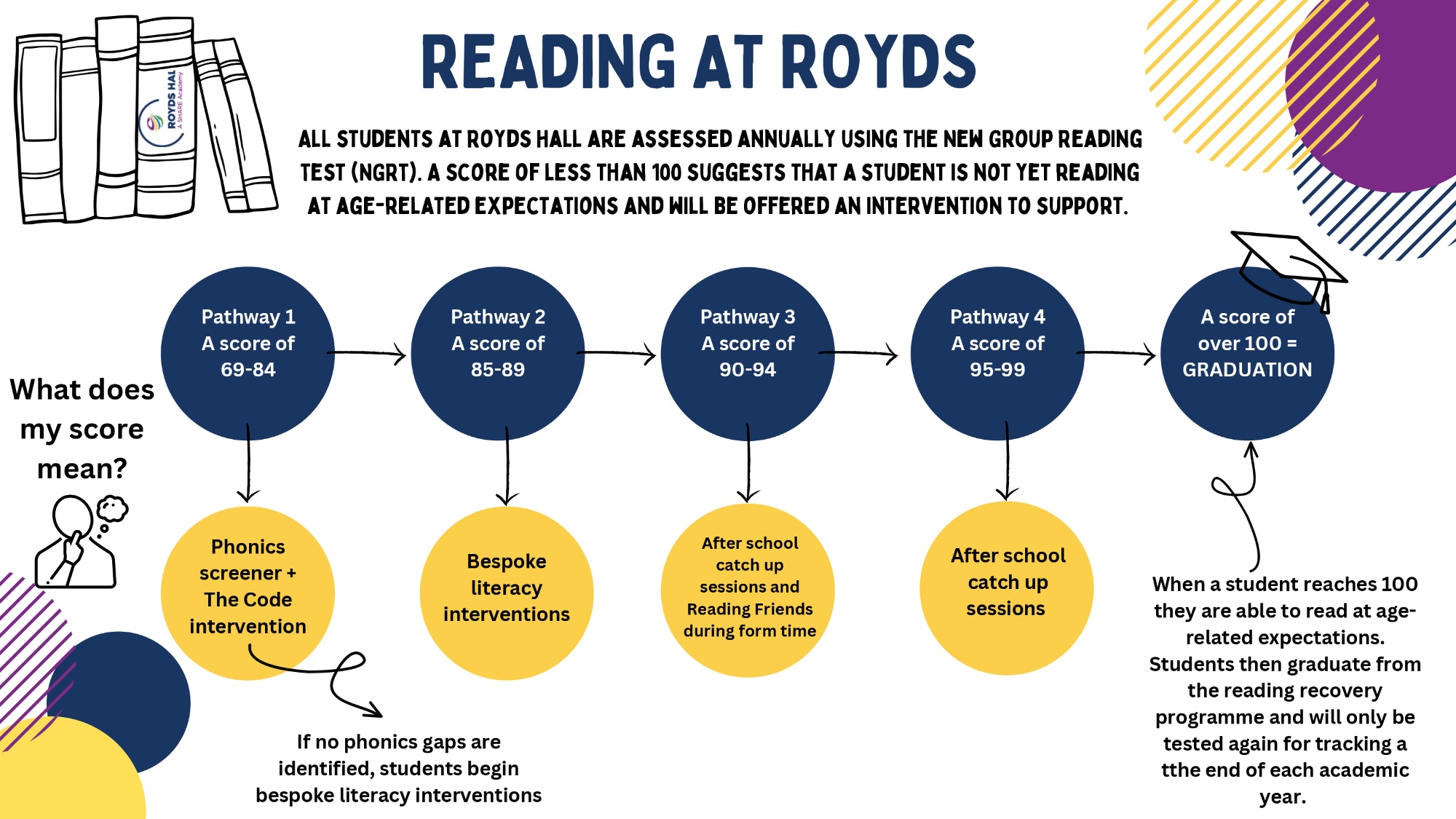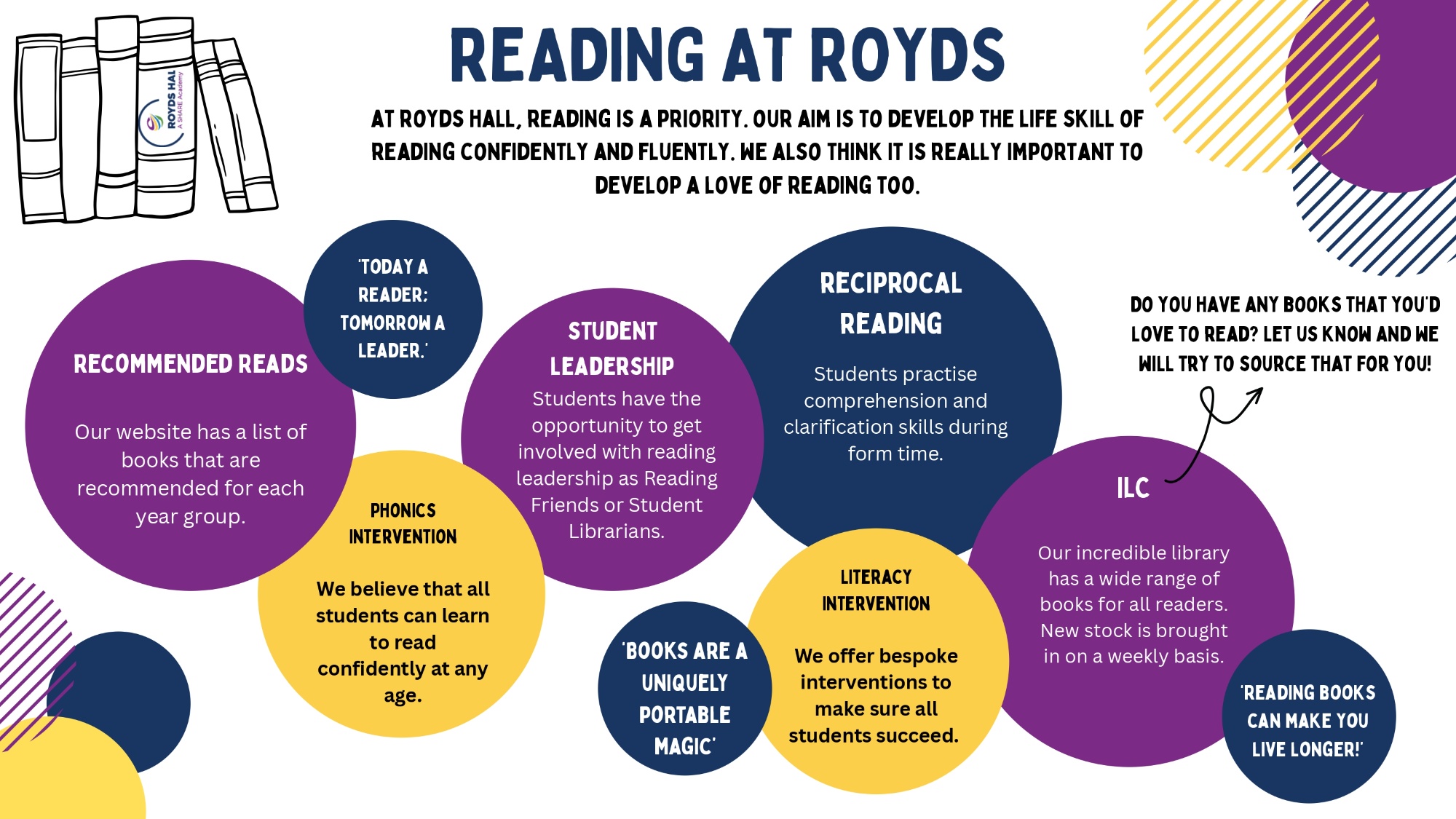Reading at Royds Hall


Our Reading and Literacy vision within the context of Royds Hall
Literacy is the road to human progress and the means through which every man, woman and child can realise his or her full potential.
– Kofi Amman
Why is reading important?
We strongly believe that developing students' reading ability and love of reading is both an academic and moral issue:
'Young people who leave school without good literacy skills are held back at every stage of life. Their outcomes are poorer on almost every measure, from health and wellbeing, to employment and finance' (2020, Education Endowment Foundation).
We know that literacy and communication are essential life skills. To support this, we believe students should have the opportunities to be able to read fluently, speak confidently and write articulately. These have been core, underpinning values when considering how to support our students in developing their communication skills. Furthermore, because literacy is central to children’s academic, emotional and social development, we firmly believe it should be at the heart of any curriculum. We want our students to develop the skills and knowledge that will enable them to communicate fluently, effectively and creatively through both the spoken and written language. Finally, we want to equip students with the necessary skills to become engaged global citizens and lifelong learners, and help them to succeed in their chosen destinations.
We work hard to instil a love of reading in our students, which is supported by a range of strategies. At Royds Hall we encourage our students to read challenging and ambitious texts to develop their skills to achieve highly. The staff promote a love of reading and this is improving the rhetoric around reading amongst our students. Our expectations around engagement with reading and literacy are clearly displayed around school, which allows us to make small but effective changes to further secure and embed students’ reading, writing and spoken skills.
We are really proud to say that Ofsted identified that 'the teaching of reading is a real strength' at Royds Hall.
What does the research say?
Reading and literacy has a hugely significant impact on the progress and outcomes of students. At Royds Hall, we have invested a lot of time into researching and investigating the importance of reading and how this impacts on students both in school, but also in their wider lives outside of school.
Our reading and literacy policy has been most heavily influenced by the following bodies of research:
- Geoff Barton, Don’t Call It Literacy! (2013)
- Education Endowment Foundation, Improving Literacy in Secondary Schools Guidance Report (2019)
- Oxford School Improvement, Building an Outstanding Reading School (2017)
These bodies of research are used by school leaders to design and implement approaches to reading that transcend and permeate the curriculum, enabling students to develop confidence and fluency in reading. We believe that reading is not only to be embedded within the English department, but in all subjects across school and that by supporting students with their reading at every available opportunity, we will help them to achieve highly.
How do we improve reading at Royds Hall?
We have six key principles that underpin our approach to reading:
- We ensure that reading runs through our curriculum.
- We use research to select the best approaches.
- We encourage all students to read challenging texts.
- We promote the enjoyment of reading for all.
- We monitor students' reading abilities regularly and share information with staff to support their planning.
- We have targeted reading catch-up programmes to support any student with a reading deficit.
At Royds Hall, we aim to support the bespoke needs of our students and have the following strategies in place to help students develop confidence and fluency in reading in both Key Stage 3 and 4:
- Accelerated Reader Programme for Key Stage 3 to support students in selecting and understanding appropriate texts. Regular, timetabled visits to the library.
- Reading Friends which enables older students to support younger students in their reading
- Fresh Start Phonics to support students in the early phases of reading
- IDL software to support reading and spelling
- Bespoke literacy interventions for students who need to develop their comprehension and catch-up programmes.
- Reciprocal Reading, which is a structured approach to teaching strategies (questioning, clarifying, summarising and predicting) that is accessed by all students through our form time curriculum and in lessons.
Key Stage 3 – Supporting students and helping them to develop a love of reading.
In Key Stage 3, we aim to identify students’ reading ability and develop a love of reading. Our strategies include:
- Testing students on entry through the NGRT testing programme to evaluate reading abilities. Regular testing throughout KS3 ensures accurate monitoring of students’ reading ability.
- Encouraging Year 7 and 8 students engage in the Accelerated Reader Programme in English lessons and the undertaking of STAR assessments each term.
- Introducing students to the school library and teaching them how to select appropriate books.
- Reciprocal Reading, which takes place in a structured weekly form time session and during subject lessons.
- KS3 Catch-up is used to close the gaps for students who require more intervention.
- Other bespoke interventions are used where required to support students, such as Fresh Start Phonics.
Key Stage 4 – Developing students into confident and independent readers.
In Key Stage 4, we aim to support students in reading confidently.
- NGRT tests are used in KS4 to ensure accurate monitoring of students’ reading ability.
- Developing reading fluency through the use of reciprocal reading in all lessons
- Encouraging students to read challenging and ambitious texts.
- Promoting wider reading through subject-selected texts.
- Promoting love of reading through a Young Adult section in the library which is available for KS4 only.
- Providing opportunities for paired reading between Key Stage 4 and Key Stage 3 students through the Reading Friends programme.
- Reciprocal Reading, which takes place in a structured weekly form time session and during subject lessons.

